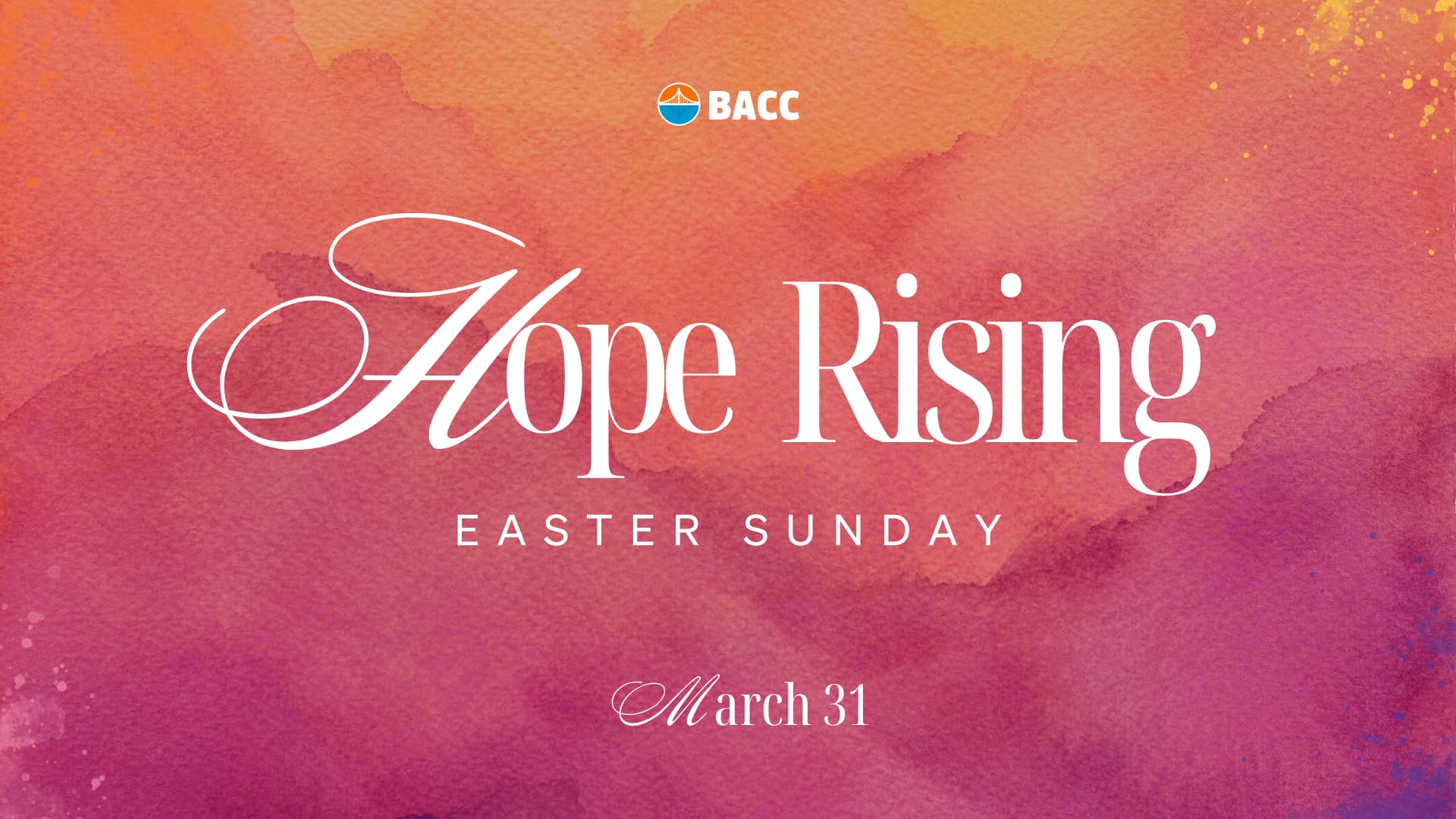Sign up for The Good Stuff
Our weekly newsletter filled with news, updates, and inspiring stories of how God is working in the Bay Area.
"*" indicates required fields
Sign up for The Good Stuff
Our weekly newsletter filled with news, updates, and inspiring stories of how God is working in the Bay Area.
"*" indicates required fields
The topic of how to read the Bible makes me think of a time in my life when I felt completely overwhelmed and in over my head.
In college, I remember switching majors from Information Systems Management to Sociology (long story). I selected my new classes a bit late, and as a result I missed the first lecture in the introductory course. By the time I made it to the second lecture, the class had progressed and I needed to catch up.
One of the books we were tasked with reading was The Sociological Imagination” by C. Wright Mills. I opened the book to the chapter the class was on, thinking I could pick things up as we went. I was wrong – two pages in and I was severely confused. So I started from the beginning, and…still confused. I had no real context or understanding even of what we were reading and how it fit into the course. I was confused, and as a result I saw the book as intimidating and out of reach.
When thinking about how to read the Bible, I think many of us can relate to having a similar feeling: I missed the introduction, and I’m not really sure where to start.
While the Bible is a book that will never cease to inspire and keep you engaged even after years of daily reading, it can be intimidating to take on if you don’t really know where to start. Many people get stuck in a box and feel intimidated by the sheer volume of scriptures, and end up never giving the Bible a shot. Tens of thousands of people search Google every day for tips on studying their Bibles.
And while the fear is understandable, it’s completely avoidable.
This is in no way a comprehensive guide to studying the Bible, but it is a good place to start if you are interested in learning how to read your Bible regularly and how to relate your Bible reading to daily life. On our site, we focus on making the Bible accessible and applicable to everyday life circumstances, and this guide is aimed to help with that. For some more scholarly or historical context related material check the resources section at the end of this article.
This mini guide on how to read the Bible is broken up into two parts: preparation and technique. Let’s dive in.
Preparation
Before diving into the Scriptures, it helps a lot to take some time to reflect on your state of mind, and make adjustments where needed. Preparing your heart and mind by removing distractions and narrowing your focus will go a long way toward maximizing how much you get out of your personal Bible study.
29 Jesus answered, “The most important command is this: ‘People of Israel, listen! The Lord our God is the only Lord. 30 Love the Lord your God with all your heart, all your soul, all your mind, and all your strength.’
Mark 12:29-30 (ERV)
I like this scripture because it reminds me that at the end of the day, the most important goal I need to have in my life is to love God in a way that is substantive and meaningful. I’ve always liked that this scripture outlines four key areas in which we need to be able to free up to devote to God. Fans of meditation or mindfulness techniques will appreciate this – if we are weighed down in these spaces, it will be hard to make a connection to God who we can’t physically see or hear. We need to be able to give our full attention if we want to get the most out of our Bible reading.
Here’s how I’ve always interpreted this scripture and what those love focuses are about:
- Heart – our emotions. Loving God by disciplining our emotions enough to care about, be interested in and obey him.
- Soul – the spiritual part of us. What we desire for our lives, what we’re passionate about. We love God when we fight to align our desires with God’s.
- Mind – our thoughts. We love and respect God when we make efforts to clear our thoughts of distractions and competing desires and focus on him and his will for our lives.
- Strength – physical action. We love God when we make physical effort to prioritize and spend time with him. For example, waking up early or praying on our knees.
The following are some tips that will help you as you prepare to engage in your personal Bible study.
Focus – set the time and place
35 The next morning Jesus woke up very early. He left the house while it was still dark and went to a place where he could be alone and pray. 36 Later, Simon and his friends went to look for Jesus. 37 They found him and said, “Everyone is looking for you!”
Mark 1:35-36 (ERV)
As it is with any worthwhile task or endeavor, there will always be distractions or other seemingly pressing matters fighting to steal our attention away from reading the Bible. Errands, work issues, relationship drama – all of these and more can make devoting time to studying the Bible feel impossible to prioritize.
As it is with any worthwhile task or endeavor, there will always be distractions or other seemingly pressing matters fighting to steal our attention away from reading the Bible.
If you’re serious about wanting to make spending time with God a priority, the best thing you can do is follow Jesus’ example in this passage. Because of his growing reputation for doing good works, Jesus was in high demand. If he wanted quality time with God, he realized he’d need to find a time and place where he could be without distraction for some time before the rush of his daily responsibilities started rolling in.
Try blocking out time early in the morning for your personal Bible study. It may require waking up a bit earlier than you’re used to, but you’ll appreciate the calm that you’ll experience. Location is important as well – try picking a place that you feel inspired by, with minimal distraction. For some that could be an empty living room, or for others a park bench. Personally I’m a fan of coffee shops – just the right amount of ambient noise, the smell of coffee to wake you up, maybe some Coltrane in the background…you can’t beat it!
Prepare for practical application
22 Do what God’s teaching says; don’t just listen and do nothing. When you only sit and listen, you are fooling yourselves. 23 Hearing God’s teaching and doing nothing is like looking at your face in the mirror 24 and doing nothing about what you saw. You go away and immediately forget how bad you looked. 25 But when you look into God’s perfect law that sets people free, pay attention to it. If you do what it says, you will have God’s blessing. Never just listen to his teaching and forget what you heard.
James 1:22-25 (ERV)
In high school physics class, I found myself on more than one occasion zoning in and out of my teacher’s lessons. It wasn’t until we got our hands dirty with the labs that the theories he was presented started to make sense. I needed real world application for the material to become relevant to me.
Practical application is the best way to ensure we don’t have the Bible go in one ear and out the other. Before you begin your Bible study, try writing out some areas in your life that you need help in and that you would like to make progress in. These areas include (but are certainly not limited to) struggling or strained relationships that need resolving, character issues that are preventing you from reaching your potential, or hardships that you see in your community that you would like to address.
Having trouble coming up with something? Try this next step…
Give yourself a reality check
31 To the Jews who had believed him, Jesus said, “If you hold to my teaching, you are really my disciples. 32 Then you will know the truth, and the truth will set you free.” 33 They answered him, “We are Abraham’s descendants and have never been slaves of anyone. How can you say that we shall be set free?” 34 Jesus replied, “Very truly I tell you, everyone who sins is a slave to sin.
John 8:31-34 (NIV)
Throughout Jesus’ ministry he was constantly giving people brutal doses of reality, whether they were asking for it or not. The Jews to whom Jesus was speaking had grown accustomed to a certain level of ignorance when it came to their religious practice. They prided themselves on having a relationship with God, and yet were unaware of any sins or faults.
The problem with turning a blind eye to what’s really going on in your heart is that you end up making the Bible about a series of rules, instead of a conversation with God that exposes your heart and gives you hope for your life (Hebrews 4:12-13). It’s hard to experience God’s love and grace if you think you’re perfect all the time.
Try spending 5 minutes or so asking yourself the following questions:
- What were the biggest emotions I felt in the past 24 hours? What occurred that made me feel them?
- What sins do I see in myself in the past 24 hours? What led me to committing them?
These questions may seem elementary, but you’d be surprised by what you’ll dig up if you tackle them in earnest. When you read your Bible, look for passages that may address the issues that pertain to you. Doing so will give you an opportunity to transform areas of your life, which in turn will strengthen your faith in the Bible’s ability to effect change.
Ask for help
29 The Spirit said to Philip, “Go to that chariot and stay near it.” 30 So he went toward the chariot, and he heard the man reading from Isaiah the prophet. Philip asked him, “Do you understand what you are reading?” 31 The man answered, “How can I understand? I need someone to explain it to me.” Then he invited Philip to climb in and sit with him.
Acts 8:29-31 (ERV)
No matter how many guides you read online, nothing quite beats a sit-down conversation with a friend who may know a thing or two. The Bible talks a lot about the process of being taught by others, and the importance of having a heart that is willing to learn. And while our increasingly interconnected, online world is making it easier and easier to access quality resources, having someone knowledgeable answer your specific questions and give you a plan that’s catered to your needs can’t be beat (at least until AI officially takes over).
If you’re interested in talking to someone about how to get started with a Bible study plan or would be interested in a personalized Bible study, you could try contacting us if you’re in the Bay Area and we’d be happy to set something up. It’s what we do! Otherwise, try attending local church services where you can network with others who may have some answers for your questions.
Techniques
Now that you’ve got yourself in the right space mentally, physically, emotionally and spiritually, let’s look at some basic practical approaches you can take to studying your Bible.
Topical study/word search
In the preparation section, we looked at a number of ways for you to unearth different areas of your heart that you may be interested in applying the Bible to. A real straightforward approach to how to read the Bible would be to use your favorite Bible study resource (either a concordance located at the end most popular print Bibles, or one of the resources listed at the bottom of this guide) and search for the topic you want to learn more about.

It can be a lot of fun to create your own Bible studies around a topic that is relevant to you. I recommend copy/pasting (or transcribing, if you’re using a physical journal) the passages you find, and write beneath it questions for yourself that help you probe your heart and apply the scripture to your life.
Book study
Another approach you can take is to select a book of the Bible and study it out in its entirety. Depending on the book’s length and complexity, you could plan to read it over anywhere from a day to a couple of weeks.
When tackling a book of the Bible, it’s important to look for a few things:
- Theme: what are the spiritual themes the book is addressing? Many of the books in the Bible were written to address a specific spiritual need. All books will show you different things about God and how he has tried over time to build relationships with the people he created.
- Context: what was occurring historically when this book was written? Is this an Old Testament book chronicling the plight of the Israelites in captivity, or a New Testament letter to one of the first century churches? Knowing who the book was addressed to and what was taking place at the time of its writing can give you a lot of insight as to how passages are to be interpreted and applied.
When deep diving into a book of the Bible, I recommend using Zondervan’s NIV Study Bible (available on hardback or digitally) as a companion on your journey. It provides line by line commentary as you read, making it easy to know what’s going on every step of the way.
As you read the book, underline or highlight passages that stand out to you. Jot down the scriptures that you want to hold onto. Try keeping your notes together using a journal so when you’re finished with the book, you can go back and recap everything you learned and make decisions based on what you took away.
Character study
One of my favorite approaches when reading the Bible is to take a character in the Bible and build a study around him or her. Some characters’ stories are told in the span of a book, and others in a mere chapter. Some characters, such as Moses, are fleshed out over the course of several books. Jesus would be the ultimate character in the Bible, since you could read just about any book and find at least some sort of allusion to him. When it comes to reading the Bible, it can be a lot of fun to explore the lives of these men and women of faith; it’s even more fun yet to see how we can imitate them today.
When studying out a character in the Bible, try asking yourself the following questions as you read:
- What inspires me about this person?
- How did God use this person’s weaknesses or shortcomings to do good?
- How do I see myself in this person, for better or worse?
- How could I imitate this person’s heart, and what life change would that require of me?
Devotionals
Another method for how to read the Bible is to find a devotional that you can read through. A devotional can mean a number of things, but in this context I’m referring to an author putting together a set of scriptures with accompanying commentary. On our site we have loads of devotionals, as well as what we call Scripture Playlists (lists of scriptures for everyday life circumstances).
YouVersion has reading plans available in its app, and they can be useful as they provide you with Bible study devotionals that you can complete over a series of time and track your progress. They can be helpful when you want to take on a daunting task like reading the Bible in 90 days and need help making sure you stay on target.
Resources
The following are a list of resources that should help as you go deeper in your Bible reading.
- DeepSpirituality.net – Deep Spirituality is a great resource for in-depth Bible studies, short devotionals, quiet time starters, podcasts, videos and even courses that can take upwards of 3 weeks to complete at a time.
- Bible Gateway – get any Bible passage in a number of translations.
- Tecarta Bible – Save highlights and notes, download translations, integrate study Bibles, and more. Available on iOS and Android. An essential when it comes to how to read the Bible.
- OpenBible.info – database of scriptures by topic, upvoted by helpfulness.

Written by
Mike Query
Mike is a digital marketing manager for the Bay Area Christian Church and is a regular contributor to Inspire. He's passionate about web strategy, music, mentorship, and his quest to find the best burrito in the Bay Area.
We can change people’s lives through relationships, spirituality, and meeting needs, says our Executive Minister on CBN News
Join women from around the Bay Area for a night of inspiration and friendship.
We do Easter big around here—and with good reason!


